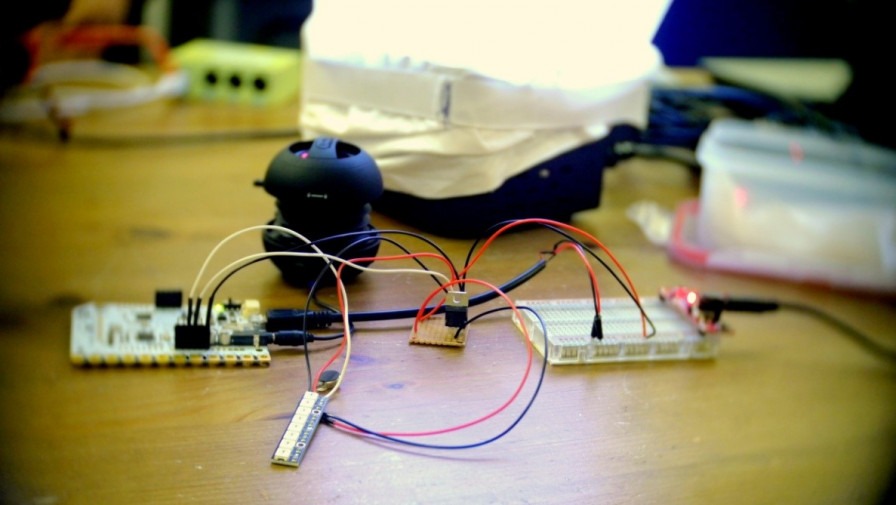DMLab: Research into Bespoke Assistive Music Technology

Summary of presentation on the Drake Music DM Lab programme, exploring how AMT can be applied and adapted to make individual bespoke instruments. Given by by Drake Music Associate National Manager for Training and Consultancy, Douglas Noble, at ISME Glasgow July 2016.
By Douglas Noble Associate National Manager; Training & Consultancy, Drake Music
We are all musicians we just been the the tools and support to unlock our musicality
This was the underlying message of the presentation I made at ISME (International Society for Music Education) World Conference in July 2016 on a panel entitled Partnerships and Progress, which looked at the development of Music Education Hubs (Hubs) and through the lens of inclusion . Co-panelist were Jennifer Raven from Sound Connections , Carol Read from Youth Music, Pete Moser from More Music and Samantha Spence from Ealing Music Service.
Drake Music (DM) are innovators, educators, curators and advocates and leaders in music, disability and technology. Our aim is to increase participation in music-making at all levels, and we use assistive music technology (AMT) to break down disabling barriers. Our vision is a world where disabled and non-disabled musicians work together as equals.
We have four programme strands:
- Learning & Participation;
- Research & Development;
- Training & Consultancy; and
- Artistic Development.
We are a national charity, an Arts Council England National Portfolio Organisation and are running a three year Youth Music Fund C Strategic Programme Think2020
Working across England that programme aims to build quality sector relationships to:
1) Contribute to every disabled young person having the opportunity to access and progress in music-making; 2) Influence national policy and practice; 3) SEND music provision to become an integral part of music hubs' offer; and 4) Establish and support a community of learning.
In our first year (2015-2016) a major project was Music Connection East working will all 11 Hubs in the East region, and the two regional Arts Council England funded Bridge organisations, to find out:
- How young people’s music making needs were being met in SEN/D or complex needs schools; and
- How good practice is recognized and measured.
Having completed this significant project, we realized that over a period of three years we had carried out consultancy activity on the approach to SEN/D music making with 14 Hubs in England, the 11 in the East, as well as Brighton and Hove, Kent and Surrey. This was around 10% of all hubs, and we thought it worth reviewing what common learning had emerged. Through doing this we identified. Music Education Hubs Top Ten Needs
These were published late in 2015, as a snapshot of our learning at that time, in collaboration with the Music Education Council, and we found that the needs mostly fell into three categories:
- The effective use of Assistive Music Technology;
- Addressing the skill sets and training needs of people working in SEN/D and music; and
- A strategic approach to funding, resources and fundraising.
All three are part of what we offer within the DM Programme, with AMT at the heart of how we remove disabling barriers to music education. We have pioneered the use of off-the- shelf AMT, such as iPads and Apps, SoundBeams Switches and Microphones, and these are important and vital tools that can unlock the music-making potential for disabled musicians of all ages.
However, the ISME presentation seemed like a good opportunity to share an area of growth and development in relation to AMT that we are exploring at DM through our Research and Development strand.
Our DM Lab programme is exploring how AMT can be applied and adapted to make individual bespoke instruments, taking advantage of the complementary knowledge and skills of technologists, coders, musicians and the DM team, through a process of experimentation, sharing and learning. Regular Hackmeets take place in London and out of this new and innovative AMT is emerging, such as the Kellycaster
Over the first six months of 2016 Gawain Hewitt, the DM Associate National Manager for Training and Consultancy, and DM Associate Musician Charles Matthews, have taken this approach live into the classroom, working with students and staff in an action research and development process, to design, make and test bespoke AMT instruments.
Below is a is a short film, , that was shown at the ISME event featuring Gawain Hewitt explaining the approach and introducing short clips of some of the work that has taken place in schools.
This work is at a very early stage and there is a great deal more to do. It raises questions around what is music making and what constitutes an instrument. For us an important challenge is around how we can make this approach and its potential, much more widely available and support it to grow alongside the use of off-the-shelf AMT.
